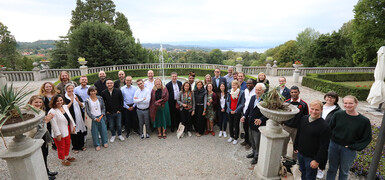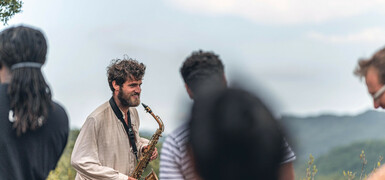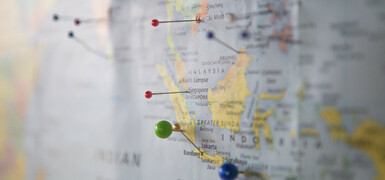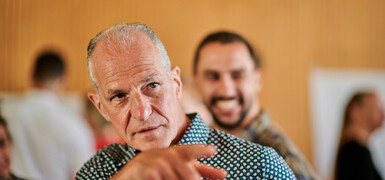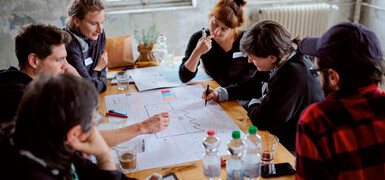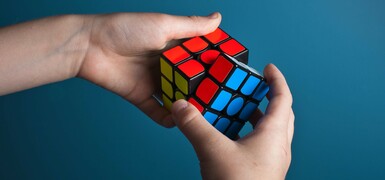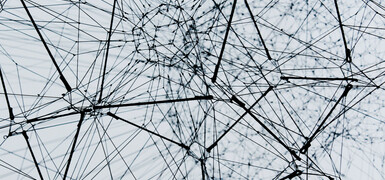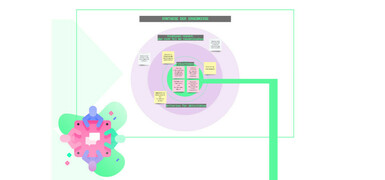
Asking for help: An opportunity to strengthen networks and projects
Asking for help is far too often perceived as showing weakness, both on a personal level as well as a network or organizational one. However, even the most diverse network cannot have experts on every relevant topic within its ranks and must ask people from outside its bubble for help. That’s why the Global Diplomacy Lab (GDL) put a special emphasis on ‘project over pride’ in 2022 and made ‘asking for help’ a standard practice for its events—and with striking results.

In 2022, the GDL organized 13 Labs—that’s as many as have been held altogether since its inception in 2014. The Lab format focuses on the co-creation of joint solutions for political problems. Over the years, GDL has built an appreciation for the importance of external experts, and in 2022, they decided to put a special emphasis on inviting relevant external experts and stakeholders to their events.
The participation of these experts was always clearly defined—i.e. through site visits, discussions, panels, etc.—and some were only active during distinct phases of a project or event. These experts brought in new perspectives and approaches that significantly enriched the co-creation process and supported participants with additional knowledge, recommendations, and connections to advance their work.
Creating a toolkit for Water Diplomacy 4.0 with the help of scientists
External experts provided a range of new perspectives to the 2022 Labs, thus helping to challenge existing beliefs and reduce biases. A highly successful example was the “Water Diplomacy 4.0” Lab. This event brought GDL members together with diplomats and water experts to examine the frequent and often intense conflicts over water resources. Transboundary water systems (TBWS) are particularly prone to conflict, and their complex nature makes cooperation and problem-solving integral aspects of their management. With the goal of co-designing a process toolkit based on the analysis of TBWS scenarios, participants worked through five case clinics using different skill- building exercises. Together, the participants developed a “Water Diplomacy 4.0 (Process) Toolkit” aimed at moving the needle on water insecurity challenges around the globe.
The creation of the toolkit benefited significantly from the participation of Irena Creed, a scientist and professor of hydrology at the University of Toronto Scarborough, who was involved every step of the way. GDL does not count many scientists among its members, and Irena’s perspective in the various discussions and working sessions proved to be invaluable.
Once the toolkit was complete, members of the Water Diplomacy Lab 4.0 were invited to speak about water diplomacy at the Transatlantic Climate Bridge Conference—a consortium of climate and energy think tanks, consultancies, and NGOs working to improve and coordinate climate policymaking between Germany, the United States, and Canada. They were also invited to speak at the annual Young Bled Strategic Forum in Slovenia in August 2022. There, they presented both the toolkit and their approach, and received feedback from additional experts and young people. In Summer 2022, when the Foreign Ministries of Germany and Slovenia co-signed an action plan to deepen the relationship between the two countries, the Global Diplomacy Lab was not only named in the document, but the Water Lab itself was specifically mentioned in the agreement.
External perspectives as a driver of diversity
Diversity is a guiding principle of the GDL, most obviously in the form of race and gender. However, diversity in age is often overlooked.
The active members of many networks often consist of similarly aged individuals. For the GDL, this group’s average age is above 30, which means that the youth perspective is often lacking. Thus, the GDL created ‘Bringing Youth Voices into 21st Century Policy’ to tap into the brains of young people and give them space to voice their perspectives.
Together with “Diplomacy by Networking”, a program of the German Federal Foreign Office’s Foreign Service Academy, GDL members organized an online Lab to bridge the communication gap between diplomats and young people. The hosts brought together 18 diplomats and 42 participants in their 20s from over 25 countries.
Through various interactive activities—such as TED-style talks and co-creation sessions—the group exchanged knowledge and perspectives on the changing economic and social environments, and the impact these trends could have on the future. In addition, each participating young person had the chance to work with a diplomat to refine and propose a policy that they would like to see implemented in their country. The diplomats then took these policy suggestions and communicated them in their respective governmental circles. By integrating these young people into the dialogue, they were able to help shape a more comprehensive perspective on these issues and contribute fresh ideas.
Turning a weakness into a strength
The Global Diplomacy Lab is all about inclusive diplomacy. Diversity helps to fill knowledge gaps, avoid silo-thinking and inherent biases, and helps to create outcomes that are more inclusive and innovative. Thus, the Lab dedicated to capturing young people’s perspectives was a start, but still not enough. The voices of many groups need to be represented in every Lab, which is a measure that GDL is consciously working on … by asking for help.
The learnings from 2022 are as simple as they are striking: Asking external experts or groups for help can not only strengthen specific projects, it can strengthen entire networks. Asking for help is not a sign of weakness, but rather a sign of strength—the strength to recognize our own limits and accepting the expertise of others.
This article was orginally published in the iac Berlin Activity Report 2022. The entire report is available as free download:
Contact
If you want to know more about the Global Diplomacy Lab, Diplomacy 4.0, or the iac Berlin's role as implementing partner, do not hesitate to get in touch with:
